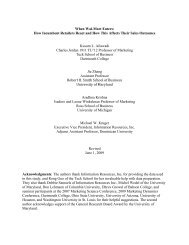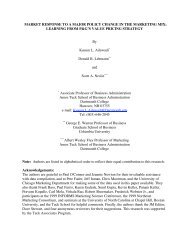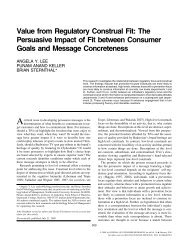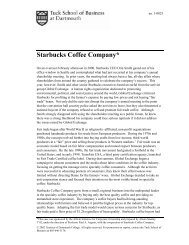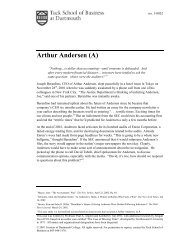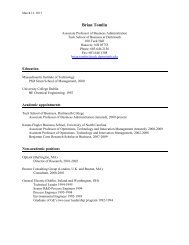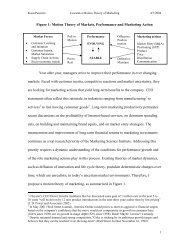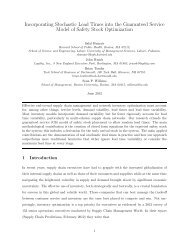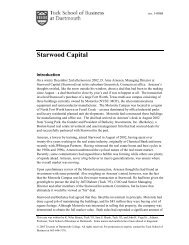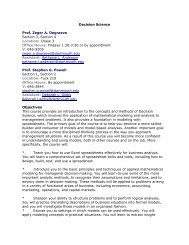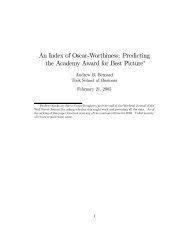tax notes international - Tuck School of Business - Dartmouth College
tax notes international - Tuck School of Business - Dartmouth College
tax notes international - Tuck School of Business - Dartmouth College
You also want an ePaper? Increase the reach of your titles
YUMPU automatically turns print PDFs into web optimized ePapers that Google loves.
‘‘We cannot distribute cash to the people. What we<br />
can do is give targeted <strong>tax</strong> cuts to garment factories<br />
and spend more on infrastructure so we can prepare<br />
for economic developments in the future,’’ Hang<br />
Chuon Naron, secretary-general <strong>of</strong> the Ministry <strong>of</strong><br />
Economy and Finance, said in a January 23 interview<br />
with Bloomberg.com.<br />
Despite its problems, Cambodia has experienced<br />
four straight years <strong>of</strong> growth above 10 percent. This<br />
growth has stemmed largely from special deals for foreign<br />
firms, such as <strong>tax</strong> holidays and greatly reduced<br />
import tariffs.<br />
Furthermore, 60 percent <strong>of</strong> that growth has arisen<br />
from just three sectors: tourism, construction, and garment<br />
manufacturing, with the latter accounting for 12<br />
percent <strong>of</strong> GDP in 2007. However, weakening demand<br />
in crucial retail markets like the United States, which<br />
receives 70 percent <strong>of</strong> Cambodia’s textile exports, has<br />
forced Cambodia to close 10 percent <strong>of</strong> its garment<br />
factories, triggering the loss <strong>of</strong> 20,000 jobs, according<br />
to Roger Tan <strong>of</strong> the Garment Manufacturer’s Association<br />
<strong>of</strong> Cambodia.<br />
Hang Chuon Naron anticipates a drop in garment<br />
exports <strong>of</strong> 2 percent. He also foresees a 20 percent<br />
drop in the number <strong>of</strong> tourists visiting Cambodia and<br />
the virtual collapse <strong>of</strong> the construction sector. He<br />
hopes the <strong>tax</strong> breaks will keep businesses afloat<br />
through the difficult times.<br />
The IMF has predicted that Cambodia will grow at<br />
a rate <strong>of</strong> 4.75 percent in 2009, the slowest pace since<br />
1998.<br />
Chile<br />
♦ Randall Jackson, Tax Analysts.<br />
E-mail: rjackson@<strong>tax</strong>.org<br />
Stimulus Package Wins Unanimous<br />
Approval<br />
The Chilean Senate on January 14 unanimously approved<br />
a $4 billion economic stimulus plan presented<br />
by President Michelle Bachelet on January 5. (For<br />
prior coverage, see Tax Notes Int’l, Jan. 19, 2009, p. 212,<br />
Doc 2009-349, or2009 WTD 5-3.)<br />
The plan, which was unanimously approved by the<br />
Chamber <strong>of</strong> Deputies on January 8, still must be<br />
signed by Bachelet, a formality that Finance Minister<br />
Andrés Velasco said would soon be addressed.<br />
Tax measures in the plan include the temporary<br />
elimination <strong>of</strong> the stamp <strong>tax</strong>, a reduction in the<br />
monthly advance <strong>tax</strong> payments made by businesses<br />
(expected to take effect as early as this month), and<br />
provisions to accelerate income <strong>tax</strong> refunds for the<br />
2010 <strong>tax</strong> year and to accelerate the <strong>tax</strong> credit available<br />
for some training costs.<br />
Velasco called the package ‘‘important and urgent’’<br />
and expressed gratitude for the political consensus that<br />
led to the approval <strong>of</strong> the package in a unanimous and<br />
expedited manner.<br />
China (P.R.C.)<br />
CHINA (P.R.C.)<br />
♦ Lisa M. Nadal, Tax Analysts.<br />
E-mail: lnadal@<strong>tax</strong>.org<br />
U.S. Companies Facing Compliance<br />
Burdens in China<br />
U.S. companies with operations in the People’s Republic<br />
<strong>of</strong> China now face much more significant <strong>tax</strong><br />
compliance obligations, according to panelists on a<br />
January 15 PricewaterhouseCoopers International Tax<br />
Services webcast.<br />
The P.R.C. government last year introduced a new<br />
annual enterprise income <strong>tax</strong> return package, new<br />
related-party transaction (RPT) forms, and new contemporaneous<br />
transfer pricing documentation requirements.<br />
The new EIT return package and the new transfer<br />
pricing disclosure rules are very complex, PwC <strong>tax</strong><br />
partner Todd Landau said. ‘‘It is always a common<br />
experience with respect to China that there’s only some<br />
<strong>of</strong> what we need to know that is known today, with<br />
additional information that will clearly need to be<br />
known as time progresses throughout the period prior<br />
to deadlines’’ for the filing <strong>of</strong> returns and the submission<br />
<strong>of</strong> contemporaneous transfer pricing documentation,<br />
he said.<br />
For example, the State Administration <strong>of</strong> Taxation<br />
(SAT) released guidance on the EIT return, plus 45<br />
pages <strong>of</strong> explanatory <strong>notes</strong>, late in 2008, PwC <strong>tax</strong> partner<br />
Michael Ho said. But those <strong>notes</strong> are no longer<br />
valid because a new set <strong>of</strong> <strong>notes</strong> (Guo Shui Han [2008]<br />
No. 1081) released on January 7 has superseded them.<br />
This has left many companies struggling to keep up.<br />
Background<br />
The SAT on October 30, 2008, issued a new annual<br />
EIT return package (Guo Shui Fa [2008] No. 101) for<br />
use by <strong>tax</strong>payers that must file returns under the EIT<br />
law that took effect on January 1, 2008. The return<br />
package includes a main return and 15 schedules, all <strong>of</strong><br />
which must be filed by May 31. (For prior coverage,<br />
see Tax Notes Int’l, Dec. 22, 2008, p. 945, Doc 2008-<br />
24993, or2008 WTD 247-14.)<br />
TAX NOTES INTERNATIONAL FEBRUARY 2, 2009 • 389<br />
(C) Tax Analysts 2009. All rights reserved. Tax Analysts does not claim copyright in any public domain or third party content.



